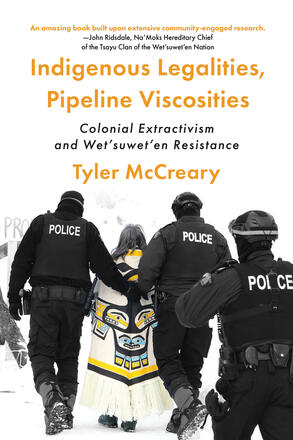
Indigenous Legalities, Pipeline Viscosities
Colonial Extractivism and Wet’suwet’en Resistance
The book explores how colonial forces seek to control Indigenous claims, and how the Wet'suwet'en resist.
La description
Indigenous Legalities, Pipeline Viscosities examines the relationship between the Wet’suwet’en and hydrocarbon pipeline development, showing how colonial governments and corporations seek to control Indigenous claims and how the Wet'suwet'en resist. Tyler McCreary explores pipeline regulatory review processes, reviews attempts to reconcile Indigeneity with development, and asks fundamental questions about territory and jurisdiction. In the process, he offers historical context for the continuing influences of colonialism on Indigenous peoples. Throughout, McCreary demonstrates how the cyclical movements between resistance and reconciliation are affected by the unequal relations between Indigenous peoples, colonial governments, and development operations. This sophisticated analysis invites readers to consider the complex realities of Indigenous and Wet’suwet’en law, as well as the politics of pipeline development.
Reviews
"McCreary examines how Wet’suwet’en territorial claims intersected with the logic of extractive capitalism in the development and review processes for the Northern Gateway pipeline project. He demonstrates the constraining effects of this process on Indigenous claims to land and territory while also revealing the manner in which such processes created space for powerful Indigenous counter-claims, challenging colonial logics of sovereignty and jurisdiction." Nicholas Blomley, Simon Fraser University
"Indigenous Legalities, Pipeline Viscosities documents Indigenous resistance to extractive projects, traditional territorial claims, and colonial energy development. The legal questions and observations are important innovations to help us better understand Indigenous-colonial resources conflicts." Andrew Curley, University of Arizona